For the fourth year now, Transparency International Ukraine assesses the transparency of city councils’ activity in 100 largest Ukrainian cities. This year, the Transparent Cities team also assessed the accountability of 50 Ukrainian cities.
Transparency is to be understood as a state in which the citizen’s right and ability are ensured to have access to information, and public authorities take an active stance in this process.
Under accountability, we understand the state of relations between local governments and citizens in which citizens have a real opportunity to be involved and influence policy-making processes, control and inspect the activities of local governments, while the latter are obliged to report publicly on their activities.
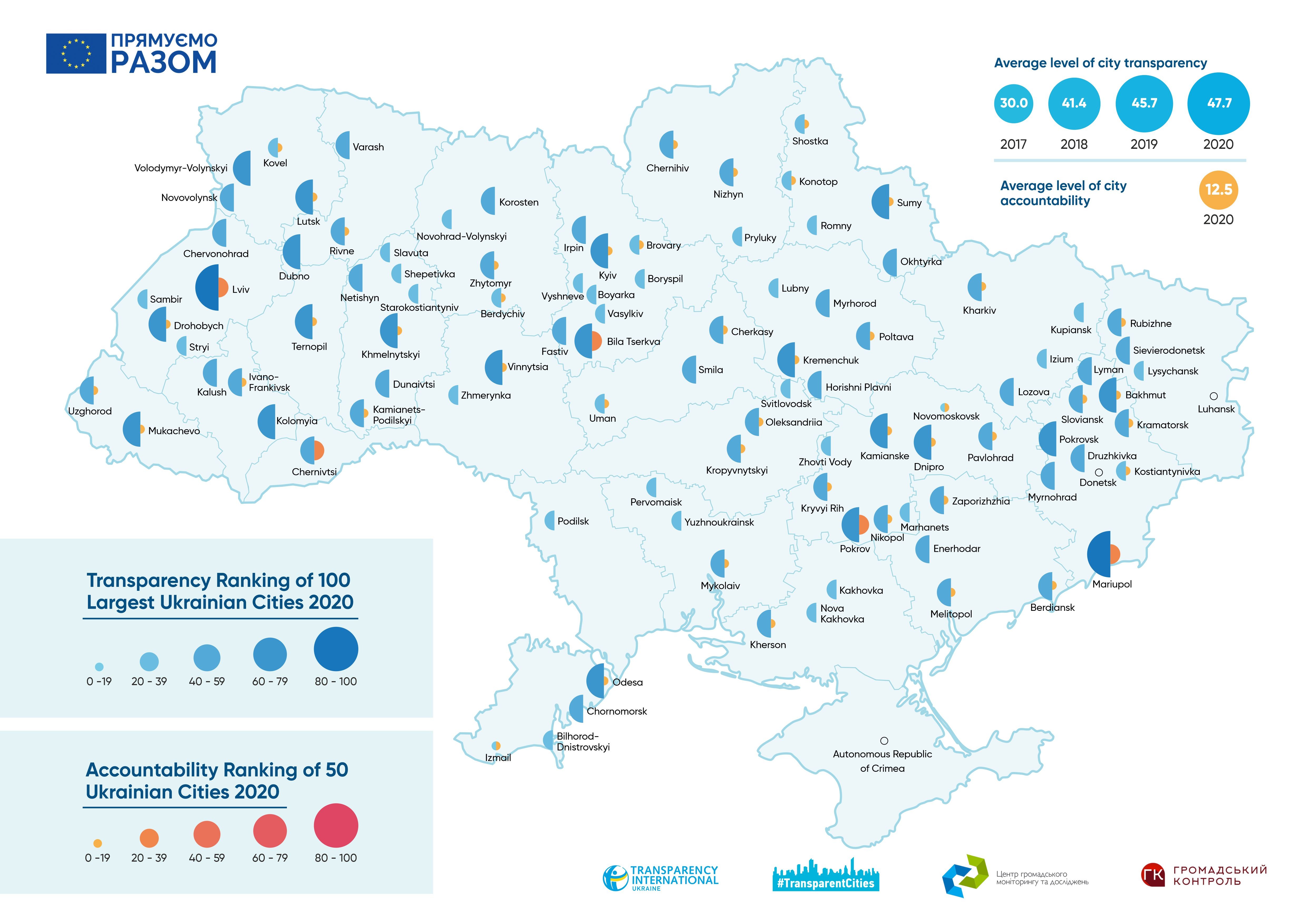
Transparency: 2020 Ranking Results
Cities are becoming more transparent. Since the last assessment conducted by analysts of the Transparent Cities program at the end of 2019, the average score has risen to 47.7.
Compared to the data of the first assessment, this figure is one and a half times higher (in 2017 it was 29.9).
This means that municipalities continue to publish new datasets and update existing ones each year, improve the functionality of their websites, implement best practices, and heed the program's recommendations to increase transparency.
This year, the average transparency growth rate is 4.4%. How significant is it compared to previous years? In 2019, this figure was 6%, in 2018—to 38%.
Despite the positive dynamics, the pace city transparency growth is declining. Proactive cities have already implemented most of the simple recommendations of the methodology, which do not require the adoption of a regulatory or other act; advice; additional financial, time, technical or human resources. Complex indicators are implemented more slowly.
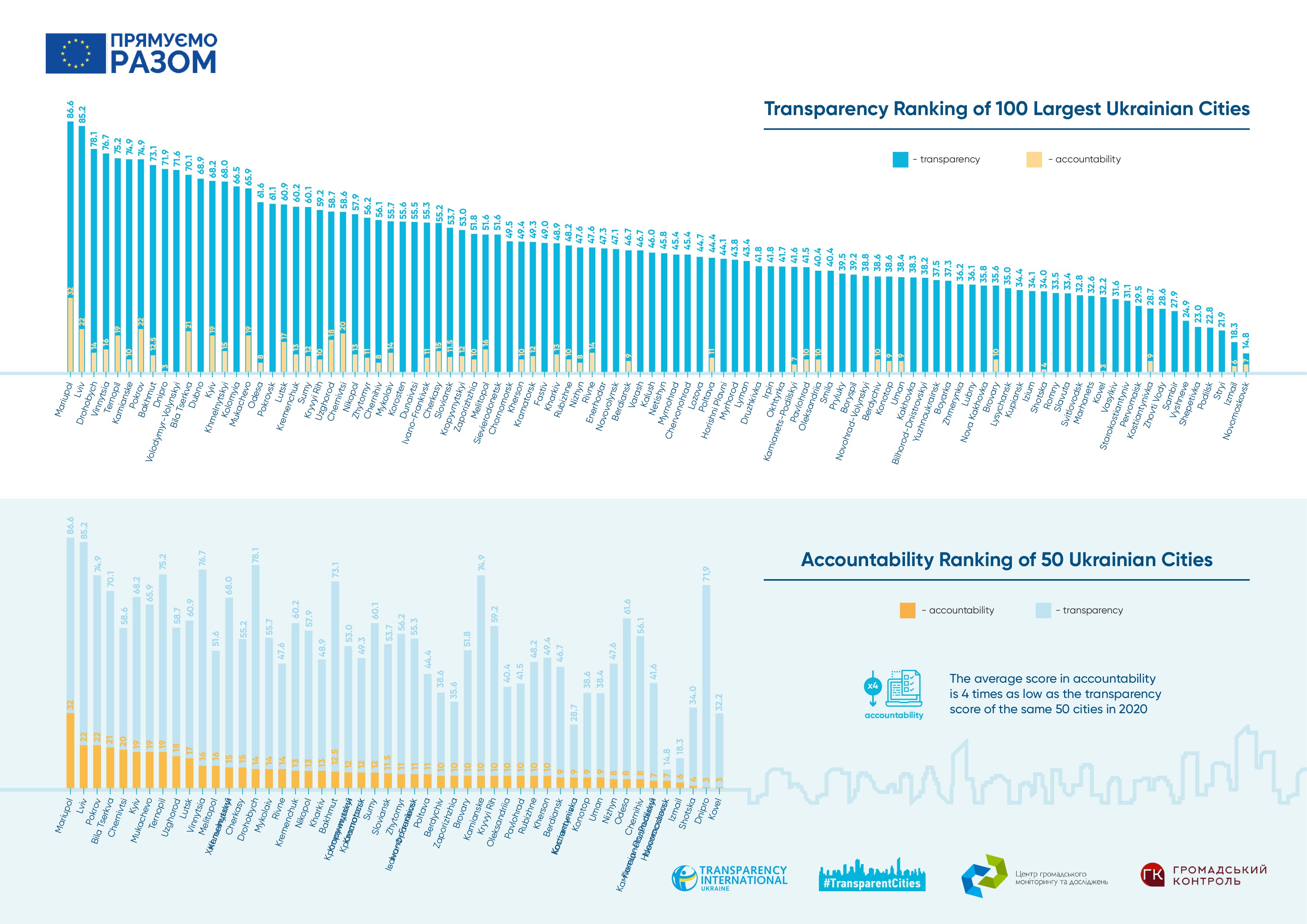
Transparency: Leaders and Outsiders
The competition at the top of the Ranking is getting fiercer every year. This year, for the first time since the launch of the Ranking, two cities at once, Mariupol and Lviv, moved to the category of “transparent,” scoring 86.6 and 85.2 points, respectively. Drohobych (78.1), Vinnytsia (76.7) and Ternopil (75.2) were also among the top five.
Compared to the ranking results of 2019, the total score of Mariupol and Lviv increased by about 12 points.
The last two cities in the ranking, Izmail and Novomoskovsk, scored less than 20 points and fell into the category of “non-transparent,” with Novomoskovsk being in this category for three out of four years, while Izmail dropped there for the first time due to deteriorating results compared to 2019.
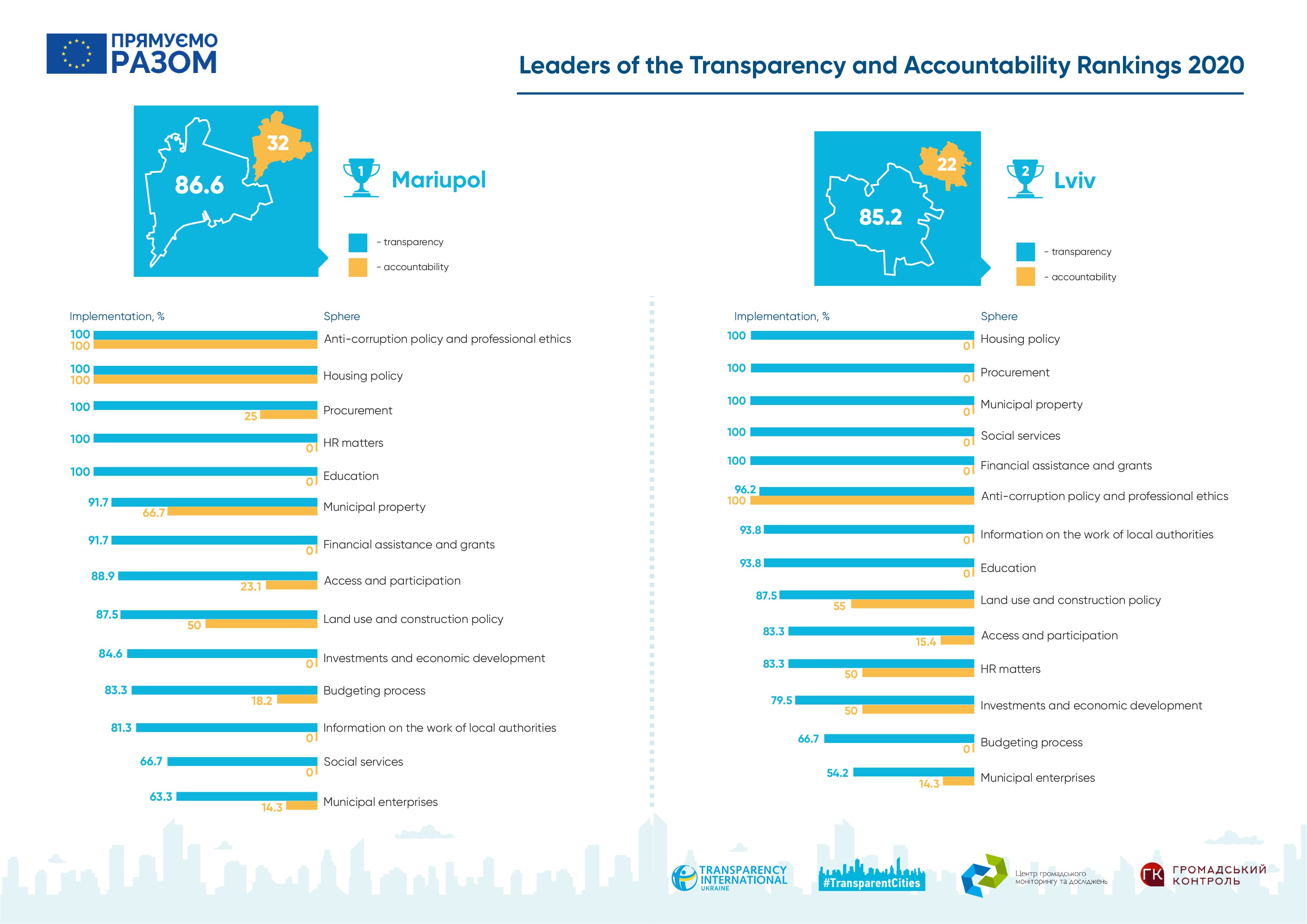
In total, out of 100 cities participating in the ranking, 2 cities are non-transparent (0–19 points), 33 are mostly non-transparent (20–39 points), 44 are partially transparent (40–59 points), 19 are mostly transparent (60–79 points), and 2 are transparent (80–100 points).
Every year, the number of partially transparent, mostly transparent, and transparent cities grows. In 2017, these three groups had only 14 cities out of 100, in 2019—64, and this year, as many as 68 cities have overcome the non-transparency line.
In addition to the average level of requirements implementation, certain trends in the spheres and research indicators also merit attention. This year's best-implemented sphere is “Education,” its indicators having increased by an average of 12.6% (to 66.3%).
In general, this year, the average level of implementation in eight spheres has overcome the 50% mark ("HR matters," "Access and participation," "Education," "Budgeting process," "Information on the work of local authorities," "Municipal property," "Financial assistance and grants," "Investments and economic development").
The worst-implemented spheres are "Procurement," "Housing policy," "Municipal enterprises," and "Social services."
Cities with the biggest growth / drop in Transparency Ranking 2020 scores
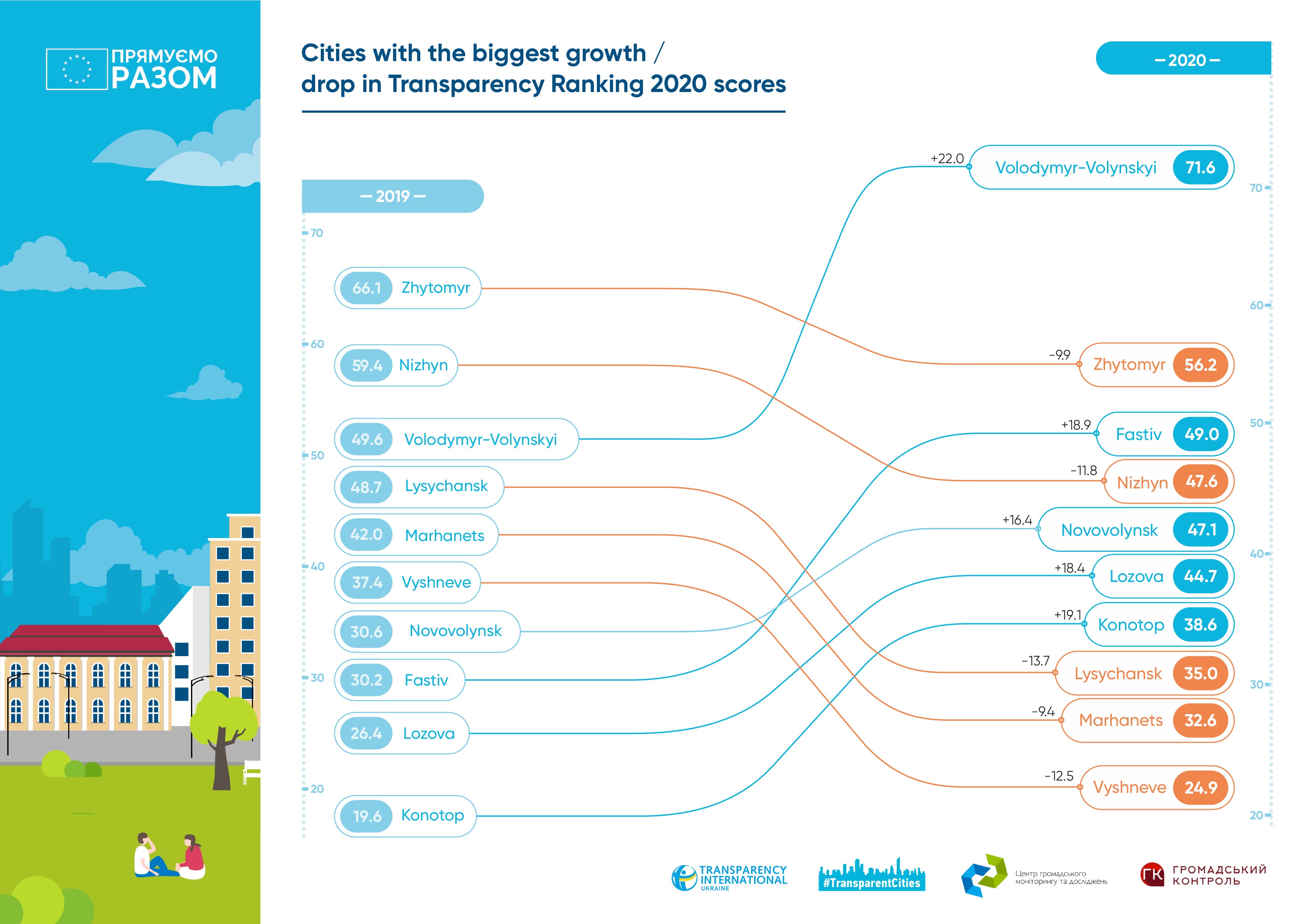
Volodymyr-volynskyi
The 2020 leader in terms of growth in the Transparency Ranking is Volodymyr-Volynskyi, which added 22 points to its 2019 score. This increase has put the city in top 10 of the Ranking. During the year, the city council improved the results in most spheres by 1 to 3 points.
Konotop
Konotop city council has improved its scores in almost all the spheres of local self-government activity. The biggest growth happened in such spheres as “Investments and economic development”, “Financial assistance and grants”, “Education”, “Anti-corruption policy and professional ethics”. No points were gained for the transparency of “Housing policy.”
Fastiv
Compared to the previous year, Fastiv gained points in 12 out of 14 spheres. Financial assistance and grants showed a growth by a multiple of five. The spheres of “Procurement” and “Social services,” where the city scored zeroes in 2019, saw some improvement last year (0.25 and 1, respectively), but there is still much room for growth.
Lozova
Lozova improved its score for all spheres in 2020, except for “Municipal property,” where it lost a few tenths. The largest increase in scores was in the areas of “Land use and construction policy”, “Municipal enterprises” and “Budgeting process”.
Novovolynsk
In 2020, the city council of Novovolynsk managed to climb 39 steps in the Ranking. The city managed to improve indicators in almost all areas by 0.5-4.5 points, the most — in the sphere of “Municipal enterprises”.
Lysychansk
The city of Lysychansk lost 13.7 points in 2020. This is the most significant decrease among all 100 cities in the Transparency Ranking. Its results reduced in 10 out of 14 spheres. It should be noted that since August 2020, the city has a military-civil administration, while the evaluation methodology is designed to analyze the activities of primarily city councils.
Vyshneve
Vyshneve showed a regression in 9 out of 14 spheres in the Transparency Ranking. In particular, the city scored a zero for five of them (“Municipal property,” “Social services,” “Investments and economic development,” “Procurement,” “Housing policy”).
Nizhyn
The scores of Nizhyn city council reduced in 8 out of 14 spheres in 2020. The scores for “HR matters,” “Budgeting process,” “Land use and construction policy” and “Municipal enterprises” have reduced by half . However, the city shows growth in "Education" and “Financial assistance and grants”.
Zhytomyr
The total score of Zhytomyr in the Ranking has dropped by 10 points due to a deterioration in 6 spheres compared to 2019: “Municipal property,” “Information on the work of local authorities,” “Access and participation,” “Procurement,” “Budgeting process,” and “Housing policy.”
Marhanets
Marhanets city council now has worse scores in 8 spheres compared to 2019. The city’s scores dropped in the areas of “Municipal enterprises,” “HR matters,” “Municipal property,” and “Budgeting process.” At the same time, it has improved its transparency in “Education. ”
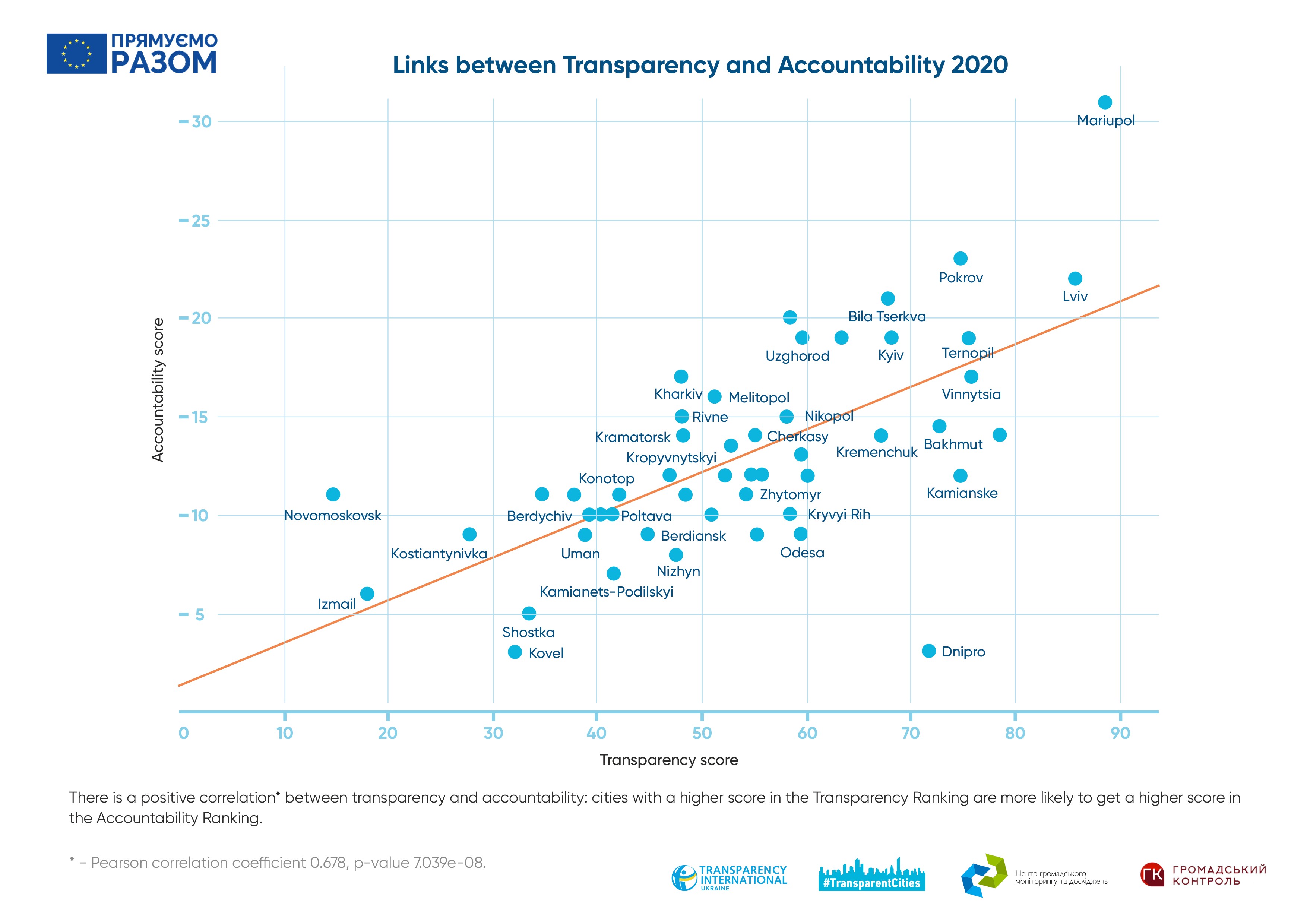
Accountability: 2020 Ranking Results
The results of the accountability assessment show a severe gap between the practical openness of the local self-government bodies' activities (admission to meetings of bodies, establishing a dialogue with society, reporting) and more formal requirements (disclosure of data, ensuring the operation of the website), of which the transparency methodology mainly consists.
This year, the average accountability score is four times as low as that for transparency (12.5 points vs. 54.4 ).
The leaders of the 2020 Accountability Ranking are Mariupol, which leads by a margin of 10 points (32.0 points overall), Lviv and Pokrov (22.0 points each), Bila Tserkva (21.0), and Chernivtsi (20.0).
Kovel (3.0 points), Dnipro (3.0), Shotska (4.0), Izmail (6.0), as well as Novomoskovsk and Kamianets-Podilsky (7.0 each) have received the minimum number of points.
Simultaneously, due to the same number of points, many participants take the same place in the Ranking: for example, the second was shared by Pokrov and Lviv, and the 29th— by as many as nine cities (Rubizhne, Kherson, Pavlohrad, Oleksandriia, Kamianske, Kryvyi Rih, Brovary, Zaporizhzhia, Berdychiv).
According to the first accountability ranking results, 45 cities were included in the category of "Unaccountable," only the five leaders mentioned above overcame the 20-point mark.
The most transparent accountability spheres in Ukrainian cities are "HR matters" (39.0%), "Anti-corruption policy and professional ethics" (30.0%), and "Land use and construction policy" (23.1%).
The worst implemented spheres of the Accountability Ranking—"Procurement," "Financial assistance and grants," "Social services," "Information on the work of local authorities".
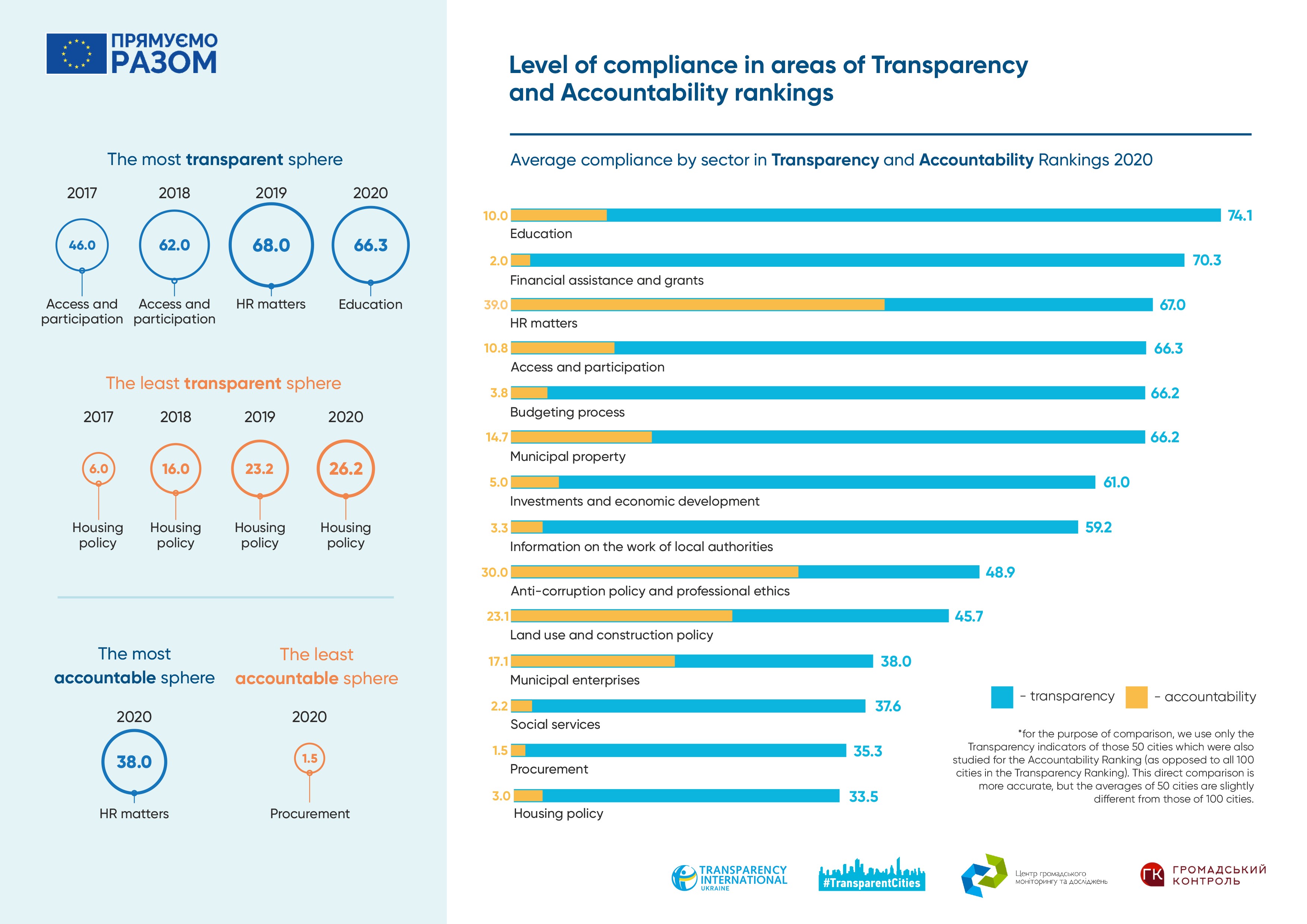
Interesting facts from the city transparency and accountability assessment
- 93 cities out of 100 have provided an opportunity for parents to apply for enrollment of a child in kindergarten and/or school online. Most of them also use resources with an open waiting line for distributing children to preschool institutions.
- Out of 50 city councils participating in the accountability ranking, 11 cities registered a profile in DOZORRO, as well as adopted a local act which makes it mandatory for the spending units to respond on the platform, but only two of them (Pokrov, Mariupol) respond to at least 80% of reviews and appeals.
- The issue of professional ethics is stipulated in the local acts of only 69 city councils out of 100, ocials — 51, even fewer — members of municipal enterprises. Only 24 city councils have an approved procedure to work with corruption reports, only 38—a procedure for regulating the conflict of interest in the executive committee.
- Only two participants of the Accountability Ranking (Mariupol and Bila Tserkva) have implemented at least one indicator from the “Housing policy” section. Both cities publish information about housing whose social status has been removed. Data on the privatization of such housing are also published. Mariupol is the only city that publishes all data on the transfer of social housing for use in accordance with the requirements of the accountability methodology.
- Volodymyr-Volynskyi gained more points in the Transparency Ranking than any other city. The city rose by 27 positions and for the first time reached the top ten in transparency. The results in “Municipal enterprises,” “Social services,” “Financial assistance and grants,” and “Housing policy” have significantly improved.
- Budget hearings are regulated in the regulatory framework of 30 cities out of 50, but only two (Ternopil and Melitopol) held them in 2020 with prior online announcements or with online streaming provided.
- Only 9 city councils met the basic conditions for citizens' access to the meetings of local council: Odesa, Mariupol, Oleksandriia, Brovary, Chernihiv, Drohobych, Kherson, Kamyanets-Podilskyi, Mukachevo. They provided online broadcasts, early announcements, and they have no discriminatory provisions in the documents, and no cases of non-admission in 2020.
- 9 out of 50 cities participating in the accountability ranking provided a way for citizens to participate in the meetings of standing commissions: Pokrov, Odesa, Mariupol, Sloviansk, Kyiv, Lutsk, Lviv, Mukachevo, Chernivtsi.
Full analytical report